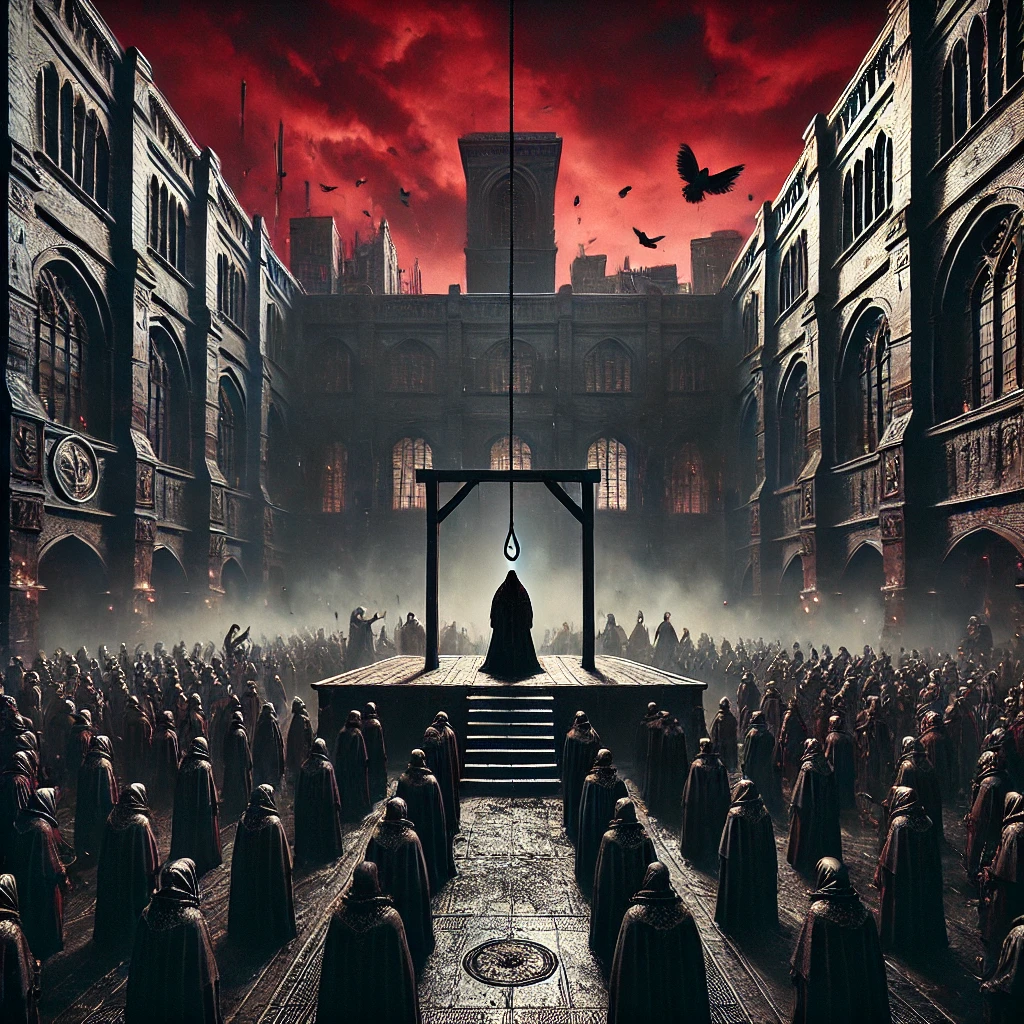Track Analysis: “One Assassination Under God”
Core Themes:
- Public execution as metaphor
- The spectacle of downfall
- Betrayal and hypocrisy
- The intersection of martyrdom and entertainment
Thematic Breakdown
1. Public Execution as Spectacle
The title itself, One Assassination Under God, evokes both political and religious overtones. The phrase “under God” mirrors One Nation Under God, invoking American identity and nationalism, but it juxtaposes this with the concept of assassination—suggesting betrayal, destruction, and a grand narrative of public persecution.
The lyrics frame an execution as an event where everyone is present, yet no one takes responsibility:
“Everybody showed up for the execution / But nobody would show their face to shoot you in the back of the head and call it sacrifice.”
This could symbolize Manson’s own experience of being vilified by the media and the public, where many were eager to witness his downfall (whether after Columbine or the abuse allegations) but reluctant to take personal accountability. The phrase “call it sacrifice” evokes the idea of a forced martyrdom—Manson being metaphorically ‘sacrificed’ by society for sins he did not commit.
2. Nightmare over Dreams
Manson has long played with themes of dreamlike distortion and nightmares, often presenting them as more authentic than conventional reality. In the first verse, he claims:
“There’s no more dreams for me to sell / I choose my nightmares wisely.”
This could be a reference to the commodification of his shock-rock persona, as if his artistic provocations were once a sellable product (dreams for consumption). Now, however, he asserts control over his own darkness, suggesting an intentional embrace of his outcast status.
3. Religious Imagery and the Burden of Sin
The bridge simply repeats:
“Assassination / Assassination / Assassination.”
This is almost liturgical, resembling a chant or a ritual execution. The song is deeply laced with Christian imagery, particularly in how it positions Manson (or his subject) as a Christ-like figure condemned by the masses.
“They don’t deserve to even say your name.”
In Christian theology, the name of God is sacred, and the idea that some are “unworthy” to even speak it elevates the condemned figure to a godlike status. This ties into Manson’s longstanding thematic interest in blurring the lines between Christ and Antichrist, between savior and villain.
Comparisons to Past Work
- “The Nobodies” (Holy Wood, 2000)
- “We are the nobodies / Wanna be somebodies”.
- Both songs explore the idea of society building up figures just to tear them down. The execution spectacle in One Assassination Under God mirrors the media circus that followed Columbine, where Manson was wrongly blamed.
- “Coma White” (Mechanical Animals, 1998)
- “A pill to make you numb / A pill to make you dumb / A pill to make you anybody else.”
- This track, like One Assassination Under God, critiques American celebrity and martyrdom. Both songs suggest that figures—whether Manson or someone else—are sculpted, consumed, and discarded by the public eye.
- “Disposable Teens” (Holy Wood, 2000)
- “You say you wanted evolution, the ape was a great big hit / You say you want a revolution, man, and I say that you’re full of shit.”
- Manson has historically positioned himself as a mouthpiece for the outcasts, yet he critiques the idea of rebellion when it becomes performative. In One Assassination Under God, the idea of a crowd gathering for a ‘sacrifice’ aligns with his long-running exploration of mob mentality and the hypocrisy of public morality.
Symbolism & Conclusion
This track sets the tone for the album, framing it as a response to both personal and societal betrayals. It intertwines religious imagery, media critique, and themes of martyrdom to present Manson as a figure unfairly crucified by public perception.
Rather than portraying himself as a mere victim, he asserts agency—choosing his nightmares, acknowledging the inescapable role of entertainment in his suffering, and rejecting the false reverence of those who turned against him.
With this as the opening statement, the album appears poised to dissect the themes of justice, public perception, and the fine line between villain and victim.
